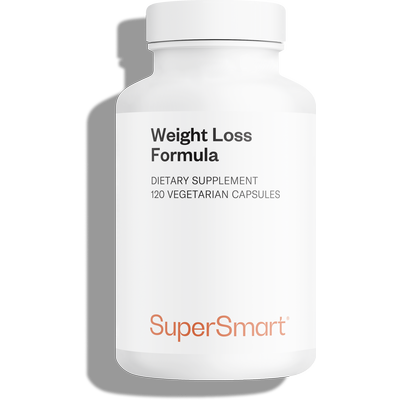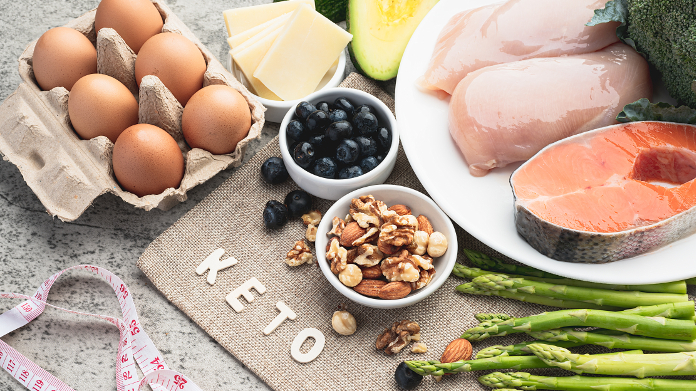What are the health and weight-loss benefits of konjac?
Rich in fibre and low in calories, konjac is winning over more and more people looking to lose weight. Here's everything you need to know about the potential health and weight-loss benefits of this Asian plant.

What is konjac?
Konjac (Amorphophallus konjac) is a perennial plant native to South-East Asia. It has been used for centuries in traditional Japanese and Chinese medicine.
Its rhizome, or root, contains a soluble fibre with exceptional water-retaining properties: glucomannan.
Now very popular in the slimming world, this food comes in several forms:
- dietary supplements (capsules or powder)
- konjac vermicelli and noodles (called shirataki) for cooking
- konjac rice for cooking
- konjac flour for recipes
- blocks to be cut up to meet different needs
If you want to add konjac to your diet, make sure you never eat it raw. Uncooked konjac contains potentially toxic calcium oxalate crystals (1). However, this precaution does not apply to the powder, which is dried before packaging.
The main benefits of konjac
Konjac: a weight loss ally
Konjac is best known for helping dieters lose weight.
Studies have looked at the effects of the glucomannan fibres it contains. These fibres are capable of absorbing the equivalent of several times their weight in water.
Once loaded with water, they form a viscous gel. When ingested with liquids during a meal, they take up space in the stomach, making you feel fuller and providing a natural appetite suppressant (2).
Glucomannan consumed as part of a low-calorie diet is therefore thought to contribute to weight loss.
What's more, in addition to its high fibre content, konjac is low in calories (10 to 20 kcal/100g) and has an unobtrusive taste, so it can be combined with a variety of condiments, sauces and foods.
This is why it is so popular with many people on restrictive diets, as it helps to maintain the pleasure of eating through varied recipes.
Aids intestinal transit
Thanks to its high fibre content, konjac has been studied for its potential effects on intestinal transit.
By swelling on contact with water, the glucomannan in konjac helps to increase the volume of stools in the intestine and improve their consistency.
Research suggests that this fibre may relieve episodes of mild and occasional constipation (3).
Potential beneficial effects on cholesterol levels
Scientific research suggests that eating konjac may have an impact on lipid metabolism. The glucomannan it contains helps maintain normal blood cholesterol levels.
According to some studies, this fibre is capable of trapping some of the fats provided by food, particularly cholesterol, thereby limiting its absorption during digestion (4).
Possible support for blood sugar regulation
Some clinical studies suggest that konjac may help to modulate postprandial glycaemic response (measured after a meal).
The gel formed by the glucomannan in the digestive system is thought to slow the absorption of carbohydrates from the diet.
This limits blood sugar peaks after meals, and also limits insulin secretion from the pancreas, a mechanism that is disrupted in people suffering from diabetes (5).
What to look out for when eating konjac
While the potential benefits of konjac are interesting, it is important to be aware of certain points concerning it and to use it with caution.
As a food, konjac has a very low nutritional density. It contains virtually no vitamins, minerals or proteins.
It cannot therefore be used as a substitute for a balanced meal, but only as a supplement, to increase its volume without increasing the calorie intake.
Additionally, for people who are not used to eating fibre, it can cause temporary digestive problems such as bloating and flatulence.
What's more, certain forms of konjac (jellies and jelly beans) have been banned in several countries, due to the risk of choking.
The most common and safest formats today are still food supplements, konjac rice and konjac noodles.
Finally, take particular care if you are taking medication. The high absorption capacity of konjac fibre could affect the absorption of some medicines.
A key ingredient in slimming food supplements
Thanks to its high soluble fibre content and ability to swell in the stomach (with few contraindications), konjac has become an essential slimming ingredient.
It is often combined with other active ingredients to act synergistically on weight management or metabolism, as part of a healthy lifestyle.
Some formulas, for example, combine glucomannan, which contributes to weight loss as part of a low-calorie diet, with amino acids involved in energy production, or with plant extracts (green coffee, green tea, guarana, etc.).
Other types of active ingredients can also be selected for their various benefits.
If you're looking to take advantage of the benefits of konjac combined with other active ingredients, you can turn to a dietary supplement containing an extract.
- Discover Weight Loss Formula, which contains propolmannan, a natural, purified and patented dietary fibre derived from konjac.
SUPERSMART ADVICE
References
- Sonthithaveelap S, Impaprasert R, Suntornsuk W, Srzednicki G. Modification of Konjac Biodegradable Material Using Deacetylation and Reinforcement Process for Its Applications in Food Packaging. Int J Food Sci. 2023 Sep 19;2023:5559783. doi: 10.1155/2023/5559783. PMID: 37767027; PMCID: PMC10522431.
- Au-Yeung F, Jovanovski E, Jenkins AL, Zurbau A, Ho HVT, Vuksan V. The effects of gelled konjac glucomannan fibre on appetite and energy intake in healthy individuals: a randomised cross-over trial. Br J Nutr. 2018 Jan;119(1):109-116. doi: 10.1017/S0007114517003233. Epub 2017 Dec 5. PMID: 29202887.
- Chen HL, Cheng HC, Liu YJ, Liu SY, Wu WT. Konjac acts as a natural laxative by increasing stool bulk and improving colonic ecology in healthy adults. 2006 Nov-Dec;22(11-12):1112-9. doi: 10.1016/j.nut.2006.08.009. Epub 2006 Oct 4. PMID: 17027233.
- Ho HVT, Jovanovski E, Zurbau A, Blanco Mejia S, Sievenpiper JL, Au-Yeung F, Jenkins AL, Duvnjak L, Leiter L, Vuksan V. A systematic review and meta-analysis of randomized controlled trials of the effect of konjac glucomannan, a viscous soluble fiber, on LDL cholesterol and the new lipid targets non-HDL cholesterol and apolipoprotein B. Am J Clin Nutr. 2017 May;105(5):1239-1247. doi: 10.3945/ajcn.116.142158. Epub 2017 Mar 29. PMID: 28356275.
- Ueno H, Haraguchi N, Azuma M, Shiiya T, Noda T, Ebihara E, Uehira Y, Uchida T, Sasaba K, Nakamura M, Uchimura N, Kita E, Umemura A, Nobe T, Sumoto E, Yano Y, Nakazato M. Active Consumption of Konjac and Konjac Products Improves Blood Glucose Control in Patients with Type 2 Diabetes Mellitus. J Am Nutr Assoc. 2023 Feb;42(2):123-129. doi: 10.1080/07315724.2021.2002739. Epub 2021 Nov 29. PMID: 34843410.
1 Days
Trustworthy company with tested products
Trustworthy company with tested products
Trusted
5 Days
Efficiency and speed
Efficiency and speed
Cuccie
7 Days
GOOD BRAND IN FOOD COMPLEMENTS
GOOD BRAND IN FOOD COMPLEMENTS - SERIOUS WITH GOOD DOCUMENTS AND DETAILS SCIENTIST. AND SERIOUS HONNEST COMMERZIALISATION. I HAVE TRUST IN THEIR PRODUCTS.
FENOGLIO Guy
8 Days
Very good experience
Very good experience, the products arrived in time, in perfect condition and are good quality. Thank you.
GABI TIRCOCI
14 Days
very good expereince
very good expereince
Jelena Đaković
14 Days
Very good products.
Very good products.
Agnes BENDSAK
16 Days
Just OK
Just OK, ordering from company for many years and being safisfied
Lynn Mae
17 Days
Recomendo
Produtos encomendados são recebidos atempadamente e de acordo com o anunciado! Muito satisfeita!
Carla Sofia
17 Days
Everything is great!
Everything is great!
Jonas
22 Days
The delivery was fast and the product…
The delivery was fast and the product is great
SOMMARIVA Gianni
24 Days
Great service and lots of information
Great service and lots of information
Gabi
27 Days
Service Satisfaction
I’m satisfied with the service; it fulfilled what it set out to do.
Anfhony Abreu
30 Days
Original product and fast delivery
Original product and fast delivery. I haven't started it yet, but will do soon.
Vincenza Catania
32 Days
Good quality
Good quality. Good service.
Leonel Guzman
34 Days
Top!!!!!!!!
Top!!!!!!!!
Michael
of experience
your money back
##montant## purchase





